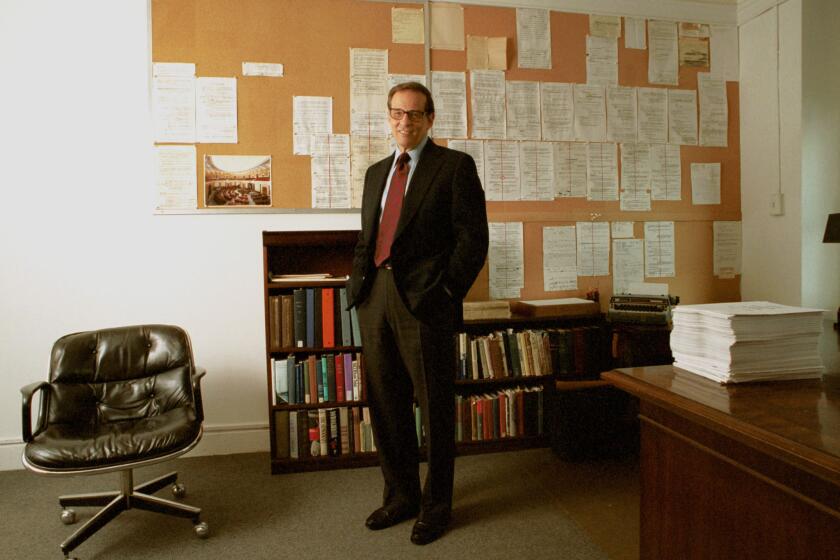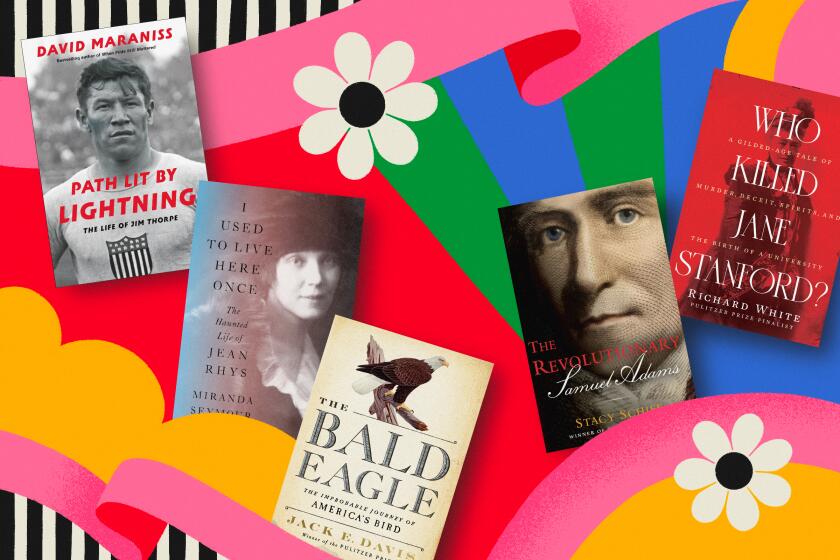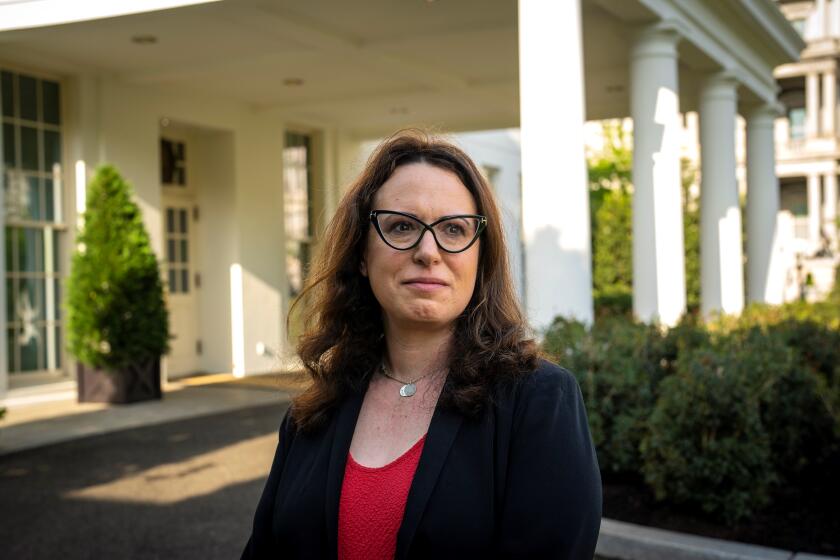Behind Robert Caro’s masterworks, a 50-year bond between writer and editor
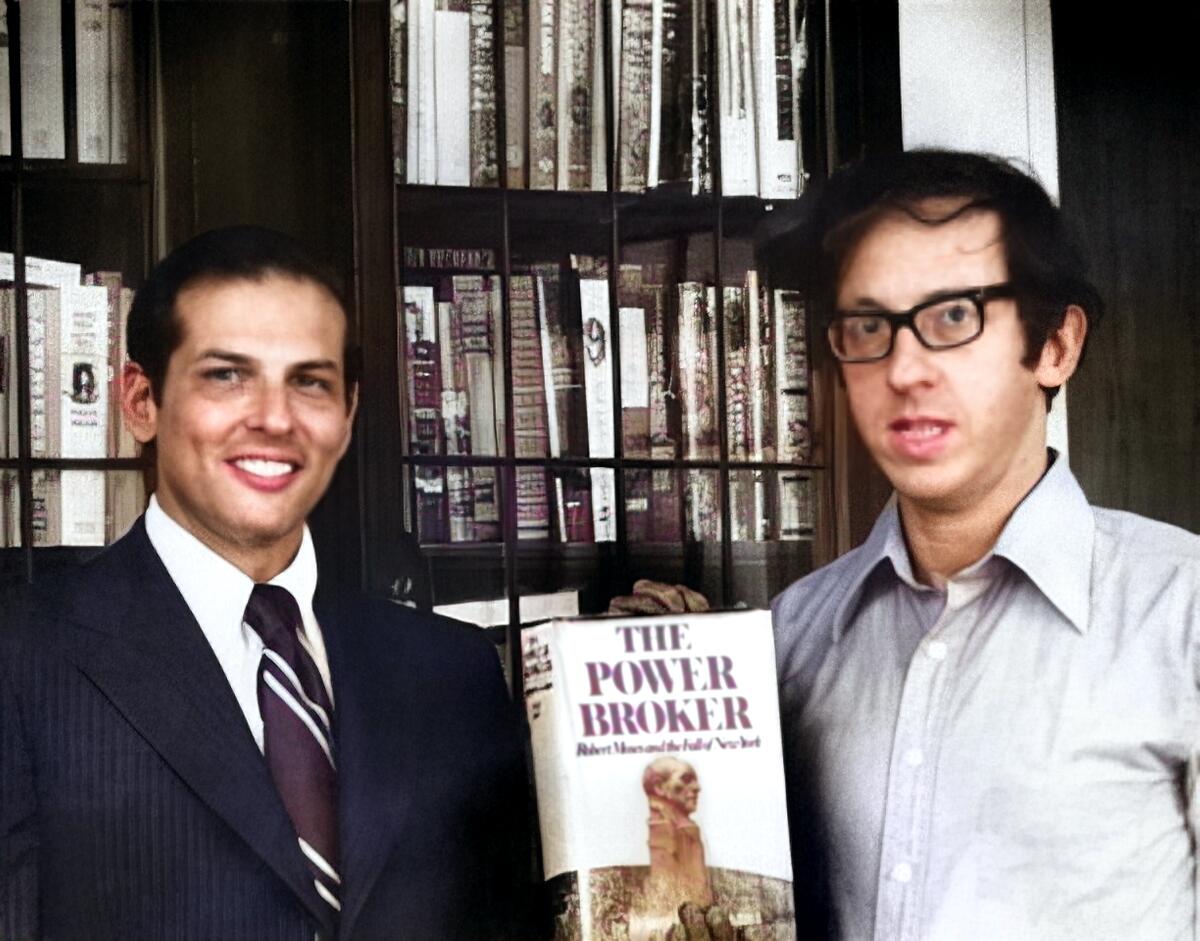
Documentarian Lizzie Gottlieb wanted to make a film about the relationship between storied biographer Robert Caro and his longtime editor. First, she had to convince two people of the project’s worthiness. One was Caro.
The other was her father.
Both said yes. “Turn Every Page: The Adventures of Robert Caro and Robert Gottlieb” is a deeply engaging and appropriately bookish chronicle of an author who writes epic nonfiction books and the editor who has been chipping away at them for some 50 years. The fact that the filmmaker is a subject’s daughter lends palpable warmth and intimacy to a story about words and research — lots and lots of both.
For your safety
The Times is committed to reviewing theatrical film releases during the COVID-19 pandemic. Because moviegoing carries risks during this time, we remind readers to follow health and safety guidelines as outlined by the CDC and local health officials.
The book that first lifted Caro to fame and made him a staple of journalism-school syllabuses is “The Power Broker,” his novelistic 1974 portrait of cutthroat New York city planner Robert Moses. But his ongoing life’s work is a multivolume biography of Lyndon Baines Johnson (four volumes and more than 3,000 pages so far). Together, these books are among the most comprehensive studies of power ever committed to the page.
He digs deep into boxes of documents seldom if ever examined before.
The editor’s work has been a little more behind the scenes but no less monumental. Gottlieb, now 91, served as editor-in-chief of Simon & Schuster and then Alfred A. Knopf before succeeding the legendary William Shawn as editor of the New Yorker for five years. These reigns made him perhaps the most powerful literary figure of his time.
Together, writer and editor present the portrait of a dedicated partnership and a study in the soft power of the written word — fodder for a documentary no longer waiting to happen.
“I had this very, very strong impulse and feeling that this was meaningful and could matter to people and could be fun and interesting,” Lizzie Gottlieb said in a recent conference call with her father. “Of course, I wanted the film to also work for people who don’t know the books ... But I also felt that it might be fun and funny, which I think it is because they’re both so incredible.”
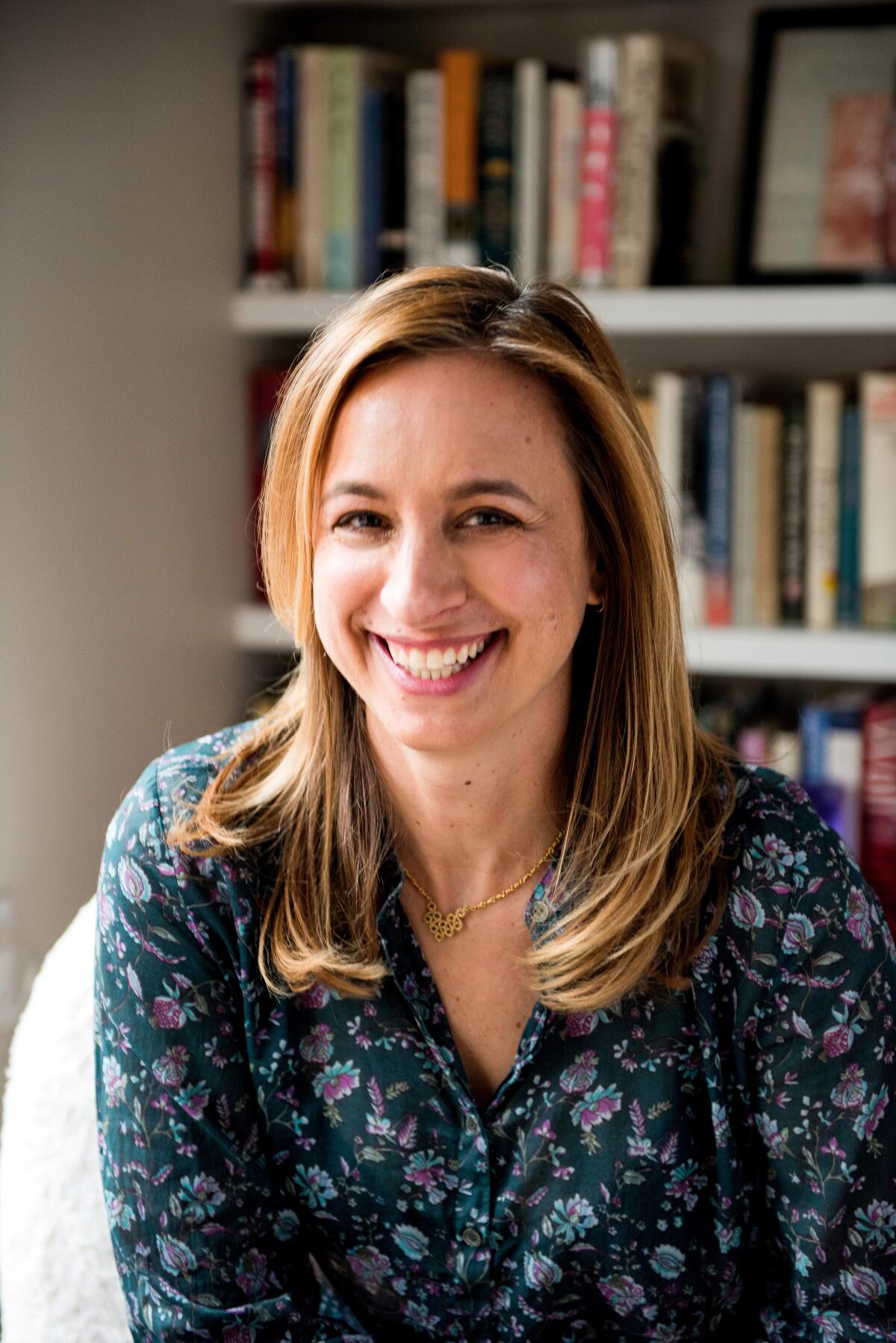
This isn’t just a devoted daughter’s praise. A very partial list of authors her father has edited includes Toni Morrison, John Cheever, Salman Rushdie, Doris Lessing, Bill Clinton (featured in the film), Bob Dylan, Ray Bradbury … and Caro.
Even among those names, Caro, 87, is as heavy a hitter as they get. But what’s delightful about “Turn Every Page” is its lightness of spirit. These intimidating talents let their guard down around Lizzie Gottlieb. Though reluctant to let the camera capture their collaboration in action — a gently comic motif in the film — they allow themselves to be seen as human, deeply passionate and laser-focused and, in the end, good friends who have spent decades in the trenches together. In showing who each man was before they met — Caro, a dogged daily newspaper reporter, Gottlieb a compulsive reader who shot through the publishing ranks — the film shows how they were meant for each other.
They also shared an initial reluctance to participate in the picture.
“I can’t say I relished doing this, but I had some kind of fun,” Robert Gottlieb says. He addresses his daughter: “I like seeing you doing things well, and since you don’t do things badly, I have that pleasure frequently.”
Lizzie: “Thanks, Dad.”
Robert: “Any time.”
As 2022 nears an end, we ask four book critics to pick their favorites of the year. Here are Mary Ann Gwinn’s top nonfiction books.
Caro took more convincing. “I didn’t want the film made, and for a full two years, I kept saying no,” the author says in a separate interview. “I did it because she started to ask so persistently that she started to remind me of me. I don’t know if that’s a good or a bad thing, but I felt she was really committed to showing some stuff in this film that had never been shown before. I think she succeeded.” (The title draws from advice Caro was given early on by an editor: “Turn every page” in your research and you won’t miss a thing.)
Lizzie Gottlieb, whose other films include a portrait of her brother and his Asperger’s syndrome (“Today’s Man”) and a look at two women trying to conceive a child together (“Romeo Romeo”), has met many of her father’s famous friends. But Caro had been a bit of a mystery. Then, at her father’s 80th birthday party, she found herself holding forth with a stranger on the development of Barclays Center in Brooklyn.
“I started just spouting random opinions that were based on nothing,” she recalls. “Suddenly, midsentence, I realized, ‘Oh, my God. I’m speaking to Robert Caro about urban planning and development. What an idiot.’ It was mortifying, but he was, of course, eager to hear what I thought and gracious.”
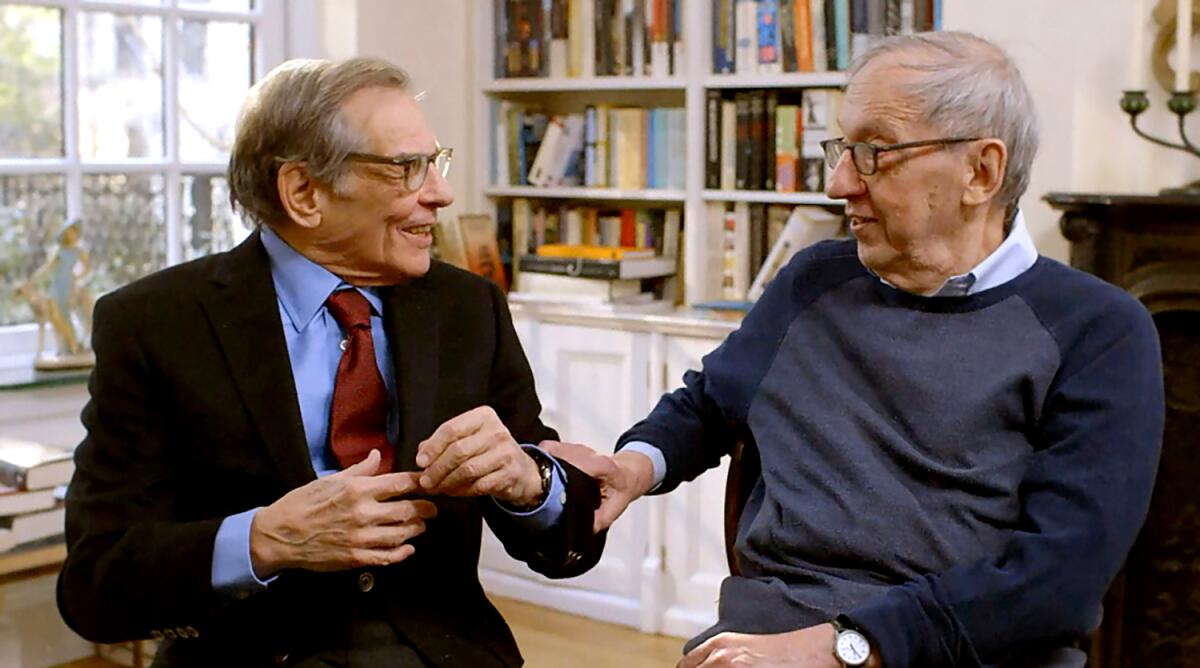
The Caro/Gottlieb relationship began with “The Power Broker.” It was clear that the book would be big, literally (1,246 pages) and figuratively. Editors were telling Caro that they could make him a star. “That is something I don’t care about at all,” Caro says. “But with him, I felt he cared about writing as much as me. He may be to this day the only person that I ever found that cared about the quality of writing in nonfiction as much as I do.”
As the film shows, the tome has become a badge of literary gravitas, with talking heads placing it on highly visible bookshelves during live shots. Lizzie Gottlieb reports that when her sister-in-law read the book on the subway, she immediately became more popular with the opposite sex. “Men come up to you and throw themselves at you if you’re reading ‘The Power Broker,’” she says. Indeed, there’s something epically manly about Caro’s painstakingly detailed narrative of distorted idealism and hunger for control — “Moby-Dick” crossed with “Citizen Kane,” but all true.
Robert Gottlieb estimates that he and Caro cut more than 350,000 words from the original manuscript, or the combined length of several standard-length books. “None of it was cut because we didn’t like it, or didn’t think it was worthy or useful or important,” Gottlieb says. “It was cut because of physical reasons. We could not bind a book that was any longer.”
“Confidence Man,” by New York Times reporter Maggie Haberman, is at times predictable and salacious. It’s also a necessary first draft of history.
Then came the LBJ project, for which Caro and his wife-researcher, Ina, moved from New York to the Texas Hill Country for a few years so they could get a better handle on his subject. The film follows the Caros on a return trip to Texas, where the author is greeted reverentially by locals.
The subject of Johnson inevitably leads to the Question That Must Not Be Asked: When will Caro finish the fifth and final volume of the biography? The film suggests the subject is best avoided, especially with Caro. Robert Gottlieb bristles when it comes up, but he gives a thoughtful answer.
“Part of being an editor is intuiting what it is that a writer wants or needs from you, and it’s different with every writer,” he says. “Some writers will be very happy if you let them get on the phone at the end of every day and they can read aloud to you what they had written ... Bob Caro does not need or want that. When we see each other, we have a great time, but we don’t talk about his books.” Until, that is, it’s time to work.
The approach has worked for five decades now. Caro marvels at the durability of the relationship. “Given the volatility, if that’s the right word, of our two personalities, I think it’s amazing that we’ve managed to work together so long,” he says. “We may not agree about a lot of things, but we talk them out, and that’s very valuable to me.”
Vognar is a freelance writer based in Houston.
‘Turn Every Page: The Adventures of Robert Caro and Robert Gottlieb’
Rated: PG, for some language, brief war images and smoking.
Running time: 1 hour, 52 minutes
Playing: Starts Dec. 30 at Laemmle Royal, West Los Angeles
